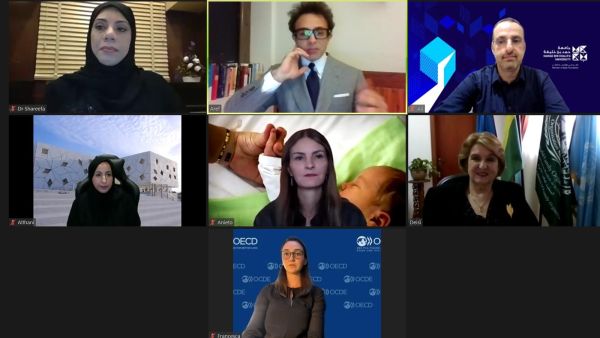DIFI Addresses Impact of Technology on Families During COVID-19

Doha International Family Institute has commemorated this year’s International Day of Families by organizing a virtual discussion to better understand how new technologies have impacted relationships – both in person and within the digital sphere – following the onset of COVID-19.
The event, titled Technology and Familial Relationships amid COVID-19, was opened by Dr. Sharifa Noman Al-Emadi, Executive Director of Doha International Family Institute (DIFI).
“Technology has reshaped our relationships with our extended families, paving the way for us to connect with loved ones we cannot see,” she said. “It has also allowed us to spend more time with our children and adolescents, especially as organizations around the world have introduced flexible working arrangements and steps to working from home.”
The panelists included: Dr. Deisi Kusztra, President, World Family Organization; Prof. Raian Ali, Professor, Information & Computing Technology, Hamad Bin Khalifa University (HBKU); Dr. Dena Al Thani, Assistant Professor and the Director of Interdisciplinary Programs, College of Science and Engineering, HBKU; Francesca Gottschalk, Analyst, OECD Directorate for Education and Skills; and Ana Nieto, Early Childhood Development Specialist, UNICEF. The session was moderated by Mr. Ahmed Aref, Planning and Content Manager, DIFI.
Discussions ranged from the challenges families are facing to advocating for necessary policy changes to the effects of digital inequalities.
Dr. Al Thani said: “The development of technology has always had great potential in supporting family dynamics. And today – with the challenges the entire world is facing in the form of the COVID-19 pandemic and the consequent isolation family members are experiencing, especially older generations – we have no choice but to support the use of technology in all facets of life.
“Digital inequality is now a major factor in the vulnerability of family members, both in terms of accessing important health information and maintaining daily activities online. Digital inclusion has become a necessity rather than a luxury option that we all need to work towards.”
As part of its commemoration of the International Day of Families, DIFI also participated in an event organized by the Group of the Friends of the Family – a coalition of United Nation Member States – titled Protection of the Family and Family-Oriented Policies in the Time of COVID-19.
The event provided a platform for the exchange of views from civil society and academia on the importance of the protection of the family and ways of strengthening policies.
Dr. Al Emadi’s presentation, titled the Impact of COVID-19 on Adolescent Wellbeing: Exploring Family Factors, compared familial relationships and adolescent wellbeing pre- and during COVID-19, focusing on family factors. It also explored the protective and risk factors of behavioral deviations among adolescents in Qatar, based on a local pilot study conducted by DIFI.
Among other findings, the study showed a decrease in arguments among family members in Qatar, prompting further studies by DIFI on the difference in results found locally in comparison to global percentages. These additional studies will examine the impact of the pandemic on the family unit from different perspectives, including one in Qatar, in partnership with Qatar University, and one in Sudan, in partnership with Ahfad University for Women.
More information can be found on DIFI’s website: difi.org.qa.
Background Information
Qatar Foundation
Qatar Foundation (QF) is a non-profit organization made up of more than 50 entities working in education, research, and community development.
Our unique ecosystem—supported by partnerships with leading international institutions—is built on initiatives that address our most pressing challenges, create global opportunities, and empower people to shape our present and future.







